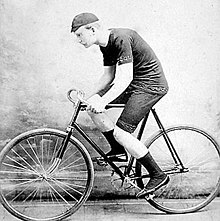Josef Rosemeyer
Josef Rosemeyer , also Joseph Rosemeyer , (born March 13, 1872 in Lingen , † December 1, 1919 in Cologne ) was a German track cyclist , inventor and entrepreneur.
Cycling career
In 1896 Josef Rosemeyer took part in the first modern Olympic Games in Athens as a member of the German team . He started in four disciplines on the Velodrome Neo Faliro : in the 10-kilometer race he finished fourth (the exact result is not known), in the 333⅓-meter time trial he was eighth with 27.2 seconds, and thus last. He could not finish the race over 2000 meters because of problems with his bike and was therefore also last as well as in the 100 kilometer race.
Rosemeyer's nomination for the Olympic Games in 1895 was preceded by successes on German cycle tracks , three wins, two second and four third places. In a ranking of the “ men's drivers ” he was 23rd and was registered as one of eleven amateurs for the World Railroad Championships in Cologne in 1895 , where he was unsuccessful. For a while he held the German record over 100 kilometers.
Inventor and entrepreneur
Josef Rosemeyer's father ran a locksmith's shop in Lingen, which specialized in the manufacture of fire- and theft-proof money, book and document cabinets as well as decimal scales and bean mills. After his father's death in 1889, Josef Rosemeyer, the eldest of seven sons, continued the business with his mother; Bicycles and later motorcycles were added to the range. Rosemeyer himself owned one of the first motorcycles in Lingen, "which was our constant concern because it never worked," said one of the brothers. Finally, from 1897 onwards, Rex brand bicycles were produced. In addition, Rosemeyer was committed to cycling in his hometown, founded the "Lingen Cyclist Association", organized races and initiated the construction of a 333.3 meter long cycle track.
In 1897 Josef Rosemeyer invented an electric arc lamp , which he registered as a German Reich patent in 1898 . In 1899 he left the family business and moved to Cologne the following year. Rosemeyer's brother Wilhelm, the father of the future racing driver Bernd Rosemeyer, took over his parents' company in Lingen .
In 1900 Rosemeyer founded the "Regina-Bogenlampen-Fabrik" in Cologne-Sülz . Ten years later the company, which in the meantime traded as “Regina Elektrizitäts-GmbH Köln-Sülz”, had 300 employees and had a turnover of 1.5 million marks. The company was later dissolved as the demand for Rosemeyer's lamps decreased due to recent developments; the property was used by the Reichsbahn for extensions. Rosemeyer himself switched to the supervisory board of the "Elektra steel wire factory". In 1912 Rosemeyer, who now referred to himself as “Factory Director retired”, presented plans for a Rhine-Sea Canal that was supposed to lead from the Rhine to the German North Sea coast , but was never implemented. For several years he was chairman of the engineering association in Cologne.
He died in 1919 of the protracted consequences of an accident and was buried in Cologne's Melaten cemetery (hall 94).
Fonts
- Continuous burning arc lamps. An easily comprehensible consideration of arc lamps in general and long-life lamps in particular, as well as their relationships to one another . Leipzig 1899
- The Rhine-See Canal . Cologne 1912.
- The Rhine canal. Suggestions about d. best implementation options, costs and the advantages of this sea waterway . Cologne 1914
- The best way to secure and expand our world trade . Berlin 1917
literature
- Ludwig Remling: "The beginnings of cycling in Lingen". In: Yearbook 2008 , ed. v. Lower Saxony Institute for Sports History Hoya eV (NISH), pp. 59–67.
Web links
- Josef Rosemeyer in the database of Sports-Reference (English; archived from the original )
- Josef Rosemeyer in the Radsportseiten.net database
- Josef Rosemeyer on lingen.de
Individual evidence
- ^ Hans Bretz: Bernd Rosemeyer. A life for German sport . Berlin 1938, p. 17f.
- ^ Remling, p. 61
- ↑ Volker Kluge : Olympic Summer Games. Chronicle I. Athens 1896 - Berlin 1936. Sportverlag Berlin, Berlin 1997, ISBN 3-328-00715-6 , pp. 29 and 39.
- ↑ digitalis.uni-koeln.de (PDF; 1.6 MB)
- ↑ digitalis.uni-koeln.de (PDF; 1.2 MB)
- ↑ Stadtanzeiger , December 3, 1919
- ^ Drafts for the canal by Josef Rosemeyer
- ↑ Remling, p. 67
- ↑ Kölner Stadt-Anzeiger v. December 3, 1919, evening edition
| personal data | |
|---|---|
| SURNAME | Rosemeyer, Josef |
| BRIEF DESCRIPTION | German track cyclist, inventor and entrepreneur |
| DATE OF BIRTH | March 13, 1872 |
| PLACE OF BIRTH | Lingen (Ems) |
| DATE OF DEATH | December 1, 1919 |
| Place of death | Cologne |

